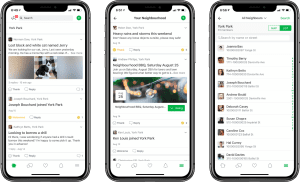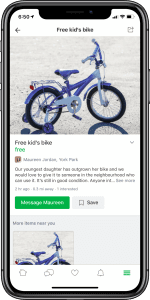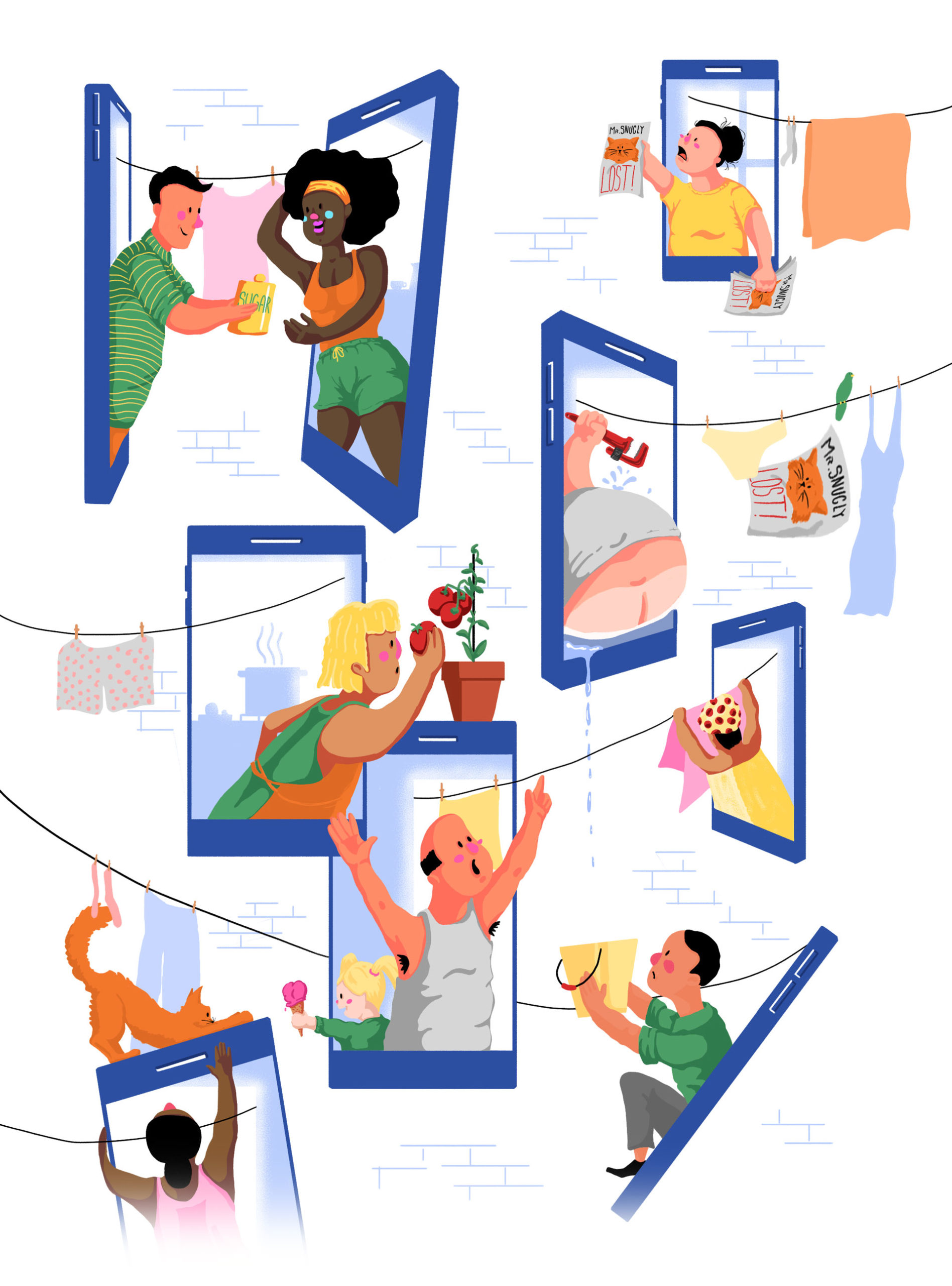[vc_row][vc_column][vc_separator color=”black”][vc_column_text]What does it mean to be a good neighbour? According to Nextdoor, kindness is key.
The San Francisco-based startup bills itself as a neighbourhood hub that offers a safe space for people to engage with others in their community by exchanging ideas, goods, and services. By cultivating a culture of kindness, Nextdoor believes that they can facilitate closer and more meaningful connections between the people in our immediate vicinity.
After launching in Canada in September 2019, Nextdoor’s Canadian arm has become the tech startup’s fastest growing international market. Perhaps that can be chalked up to Canadians and their affinity for politeness, stereotypical as it may be. In fact, among the 11 markets that Nextdoor is active in, Canada ranks highest in politeness, according to their own data.
In a time defined by social media’s authoritarianism on human relationships (and now COVID-19), Christopher Doyle, Canada Country Manager for Nextdoor, believes that the company can help Canadians foster deeper relationships offline and, ultimately, become better neighbours.[/vc_column_text][vc_separator color=”black”][vc_column_text]CAN YOU TELL US A LITTLE ABOUT NEXTDOOR?
Our purpose is to cultivate kindness and ensure everyone has a neighbourhood to rely on. Nextdoor was founded explicitly to connect neighbours to each other and to their local community. We are a neighbourhood hub.
We also believe that when local businesses thrive, local communities do as well. As a business owner, you can claim a business page within a neighbourhood. We try to make it easy to connect people who might have useful items for sale or for free so there’s a section in the app called For Sale or For Free, and that goes beyond Canada for the global product.
The last and most important pillar of the product is the public service platform. Within Nextdoor, neighbours are able to stay connected to things like local police and fire. We launched in partnership with the Canadian Red Cross and they’ve been a really vital partner for us, especially in the times that we’re going through now. For example, they published an excellent post on tips to stay safe during COVID-19. It’s those types of posts and information sharing that we have where official voices are available to neighbours so they can connect and get the correct information.
ESSENTIALLY, PEOPLE ARE TAPPING INTO THEIR COMMUNITY, ABLE TO FACILITATE SOME SORT OF COMMERCE OR TRADE, AND ACCESS CONTENT RELEVANT TO THEIR NEIGHBOURHOOD?
That’s exactly right. What’s really interesting about Nextdoor and one of our great benefits is that we’re organized by neighbourhoods, which are built on trust. Everything is private to its own neighbourhood meaning you couldn’t Google my neighbourhood and see what we’re all talking about. It increases the level of trust. Everyone who joins Nextdoor also has to be a real person. Your real name and address are verified before you can join. Our belief is that it raises the level of discourse ensuring civil and helpful conversations. It’s about neighbours helping neighbours, and in that sense, requires it to be very trustworthy. And when it comes to public agencies like the Red Cross, we give them access to post content province wide so they can communicate vital information. Alternatively if it was a hyper-local, they could also post content only relevant to your community and neighbourhoods.


TRUST IS A RECURRING THEME. HOW DOES NEXTDOOR NAVIGATE PRIVACY ISSUES?
We are a more trusted platform because we are built on this idea that you are who you say you are online. This is not a platform for anonymous accounts or bots and trolls. We have various ways that we verify information that’s going out to make sure it is safe. The majority of Canadians right now are joining Nextdoor through the mail with Canada Post. Interested members would get a secure invitation where they would verify their code in order to join. This slows down the process and embeds a sort of purposeful friction so not just anyone can make an account easily.
WHAT DO YOU THINK IS UNIQUE ABOUT NEXTDOOR THAT NO ONE ELSE IS DOING RIGHT NOW, ESPECIALLY IN THE WAY THAT YOU DO IT?
The number one difference is that we have tools on the platform that are made specifically for neighbours to connect with each other. That would be the biggest difference from any other platform. We want members to connect and meet community members who are deeply involved in their community.
Our community leads go through a pretty robust outreach program. We work with thousands of leads across Canada and we communicate with them about tips on how to grow your neighbourhood. We also ensure that there’s civil discourse.
Our mission is to cultivate kindness and connect neighbours to each other and their community. For me, when you have a purpose that’s rooted in kindness, everything you do after that falls in line.
DO YOU DEFINE YOURSELVES AS A SOCIAL NETWORK? HOW DOES NEXTDOOR CATEGORIZE ITSELF AS A BUSINESS?
We call ourselves a neighbourhood hub. There are some differences between us and what others would call social media. One of those core differences I would argue is that we’re not a platform that rewards online interaction regardless of content. There are algorithms on other platforms that everyone is aware of and it doesn’t matter what the content is—if lots of people are engaging with it, it will be surfaced to you. We don’t work that way.
We have what we call a ‘Kindness Reminder.’ What it does is detect if you are using words that have commonly been reported as violating our policies and will ask you to reconsider. A large percentage of the time people actually rewrite the post or delete what they were saying. We actually want people to slow down and be kind to each other.
The other big difference is we actually encourage people to get off of the app and meet in real life. We don’t want you to be addicted to this and never get off. We want you to actually go and meet your neighbour and plan a community event, a barbecue, or a garage sale.
WHAT IS YOUR FAVORITE FEATURE ON THE PLATFORM?
I have two favourite features. One is the ‘Groups’ feature because that is where you can join smaller groups within your community. The second would be the main feed because that’s where you see most of the community engagement. I love seeing neighbors connecting based on things that they love. Nextdoor brings people together, and then they can set up groups based on their interests. You might see a dog-walking group or an art group. There’s a soccer parent one in my neighbourhood.
WHAT KIND OF RESEARCH GOES INTO ADDRESSING CULTURAL DIFFERENCES IN THE VARIOUS MARKETS THAT YOU ARE IN?
We take great care to recognize the different ways that people interact globally through a local lens. Within Canada that meant launching with our two official languages available so it was accessible from province to province. We’re 100 percent Canadian and we want to be 100 percent locally relevant to your neighbourhood. Whether you’re in Calgary or Quebec City, we want to make sure that you’re having an amazing experience.


YOU WORK WITH COMMUNITY LEADS TO BUILD YOUR NEIGHBOURHOOD TEAMS. HOW DO YOU FIND THESE PEOPLE WHO ARE ESSENTIALLY BRAND EVANGELISTS?
I’ve been able to see it in Canada since we launched and also learn from markets around the world. What has been at the core for us is community leads. Many of the leads I’ve spoken to will describe themselves as ‘the founder of my neighbourhood’. These are people who are deeply involved and really care about their communities. They were waiting for Nextdoor to launch and essentially founded their neighbourhood. They’ve invited people; there’s even a lead in Calgary who has created little business cards on his own with a QR code and has signed up more than 600 people.
‘KINDNESS’ IS AN INTERESTING WORD TO ASSOCIATE YOURSELVES WITH BECAUSE IT’S A BIT SUBJECTIVE. HOW DO YOU DEFINE AND MEASURE IT WITHIN THE CONTEXT OF YOUR COMPANY?
For us kindness really means a couple things. At its core, it means ‘neighbours helping neighbours.’ That is really what we’re here to do. We’re here to lend support to each other in good times and bad. If we’re all here for each other, it’s going to be much better. It also means meeting together in real life and making sure that the conversations that we have are always helpful. Our CEO, Sarah Friar, talks about this a lot; there is a great power in learning about different perspectives in your neighbourhood. It doesn’t mean that everyone’s always going to agree on Nextdoor, but that we are polite. We have data that shows that Canada is the most polite nation per capita. That’s not to say that as we grow, people are always going to agree with each other. But we believe that you can have a dialogue that is constructive. It’s not the place for toxic discussions.
HOW DO YOU THINK NEXTDOOR PLAYS INTO THE DIALOGUE AROUND LONELINESS AND MENTAL HEALTH? DO YOU SEE NEXTDOOR BEING A PART OF THAT CONVERSATION?
It is absolutely key and something that we really believe in. While we’re more connected globally than ever before, we’re actually more disconnected than ever. We had a study show that loneliness is even more dangerous to your health than smoking cigarettes regularly every day. There is a real danger to people that is caused by isolation and loneliness. It is a massive problem and it’s something that we feel Nextdoor is at its core trying to combat. In Canada, we’ve seen people reach out to their neighbours to just go for a coffee, meet up over breakfast, and get together for an event. Nextdoor has also been important for some of our most vulnerable communities who really need a lifeline. In my neighbourhood, there were people who would come by to clear snow and walkways for others. For us, we don’t measure success through vanity metrics. We measure success by how many people you helped in your neighbourhood. How many people went and helped clear snow for an elderly neighbour who really needed it. It’s the stuff that makes a real difference. We describe kindness as the best solution to loneliness.[/vc_column_text][/vc_column][/vc_row]













